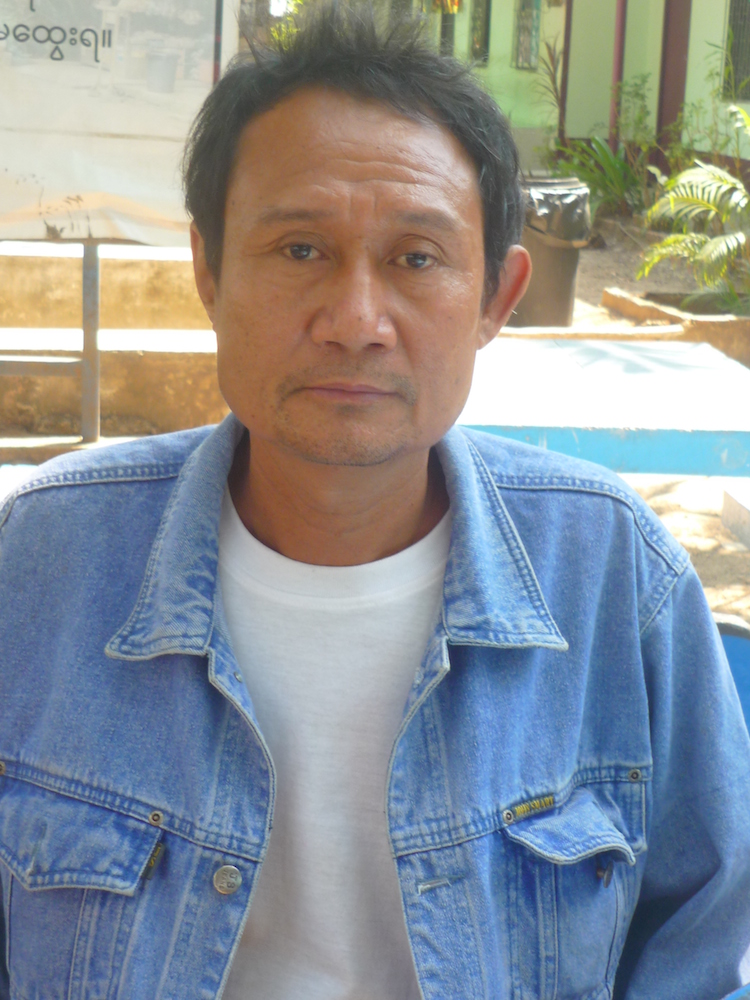U Aung (Kidney Stones)
December 18, 2013 • Posted in BAMF Current patients
 U Aung is a fifty-year-old man who came to BAMF suffering from kidney stones. He and his wife live in Win Kha Na village in Karen State, Burma. They earn their living as farmers, planting and harvesting rubber trees and have 5 children, 4 of which still live at home and help on the family’s farm. He says he never went to school or learned to read and write. When he was 8-years-old, his father passed away and since then he has struggled to earn a living and support his family. U Aung said that fighting between the Burmese Army and the KNU over the last 5-10 years has affected his livelihood; he and his family have often had to flee from their farm in order to escape the fighting. He said that every house in their village was expected to provide bamboo to the Burmese military base close to their village. He added that he has been arrested and taken as a porter for the Burmese Army on three separate occasions and his wife has also been taken as a forced laborer on the military base.
U Aung is a fifty-year-old man who came to BAMF suffering from kidney stones. He and his wife live in Win Kha Na village in Karen State, Burma. They earn their living as farmers, planting and harvesting rubber trees and have 5 children, 4 of which still live at home and help on the family’s farm. He says he never went to school or learned to read and write. When he was 8-years-old, his father passed away and since then he has struggled to earn a living and support his family. U Aung said that fighting between the Burmese Army and the KNU over the last 5-10 years has affected his livelihood; he and his family have often had to flee from their farm in order to escape the fighting. He said that every house in their village was expected to provide bamboo to the Burmese military base close to their village. He added that he has been arrested and taken as a porter for the Burmese Army on three separate occasions and his wife has also been taken as a forced laborer on the military base.
U Aung says he first noticed his health problem 3 years ago. He began experiencing pain in his back and abdomen and would suffer from fevers. He first tried to seek treatment at a local clinic in Chaw Loh village in Thailand in 2009. There, doctors took x-rays and ran blood and urine tests and determined that there was a problem with his kidney. Doctors gave him medication to help treat his symptoms, but advised him that because he is not a Thai citizen, he would not be covered by the Thai health system and would have to pay any medical fees out of pocket. They advised him to return to Burma to seek treatment. The medical fees at the clinic totaled 1,000 baht ($35 USD). He started to feel a bit better after taking the medication, but when the medication ran out, his symptoms returned. He tried using traditional herbal medicine, but did not notice any improvement in his symptoms. In total, he spent about 45,000 kyat ($50 USD) on traditional medicine. As he continued to experience symptoms, his daughter borrowed money from their neighbor so that her father could go to Mawlamyine Hospital in Burma. He traveled to Mawlamyine in November 2012 where doctors ran blood tests, urine tests, and x-rays. He was diagnosed with a kidney stone and his doctor recommended that he go to Rangoon Hospital for surgery. The doctor gave him enough medication to treat his symptoms for 10 days and the total cost for this visit was 200,000 kyat ($233 USD). U Aung’s family had to borrow money from a neighbor at a 5% interest rate to pay for his hospital bill. His daughter had to work long hours at a shop to pay this loan back.
When asked about the current state of the Burmese health system, U Aung said that it is very common for patients to have to pay bribes when they go to the hospital in order to get better quality treatment. Patients that do not pay bribes tend to be ignored by hospital staff, while those that do pay can expect more attention and a better quality of care.
U Aung’s cousin had heard about Mae Tao Clinic and advised him to seek treatment there. He traveled to Mae Sot and after medics examined him he was referred to BCMF. During his interview he said that he continues to feel tension and pain in his kidney and feels back pain when he is sitting for extended periods of time. He cannot walk for long distances because he gets tired very easily. His urine is consistently cloudy and he feels like he needs to urinate frequently. As his condition has deteriorated and he has continued to experience pain and fatigue he is no longer able to work. However, he says he can manage most day-to-day tasks.
U Aung says he has been stressed and worried about his health. He says that he sometimes argues with his wife because they do not have money for his treatment. He worries that he will have to live with his pain and fatigue until he dies. He hopes that if he recovers he can return to work.
He said that his name in Karen is “Aw lah” which means “loud speaker”. His uncle gave him the name because he cried so much when he was a baby.
U Aung is currently undergoing treatment in Chiang Mai.


